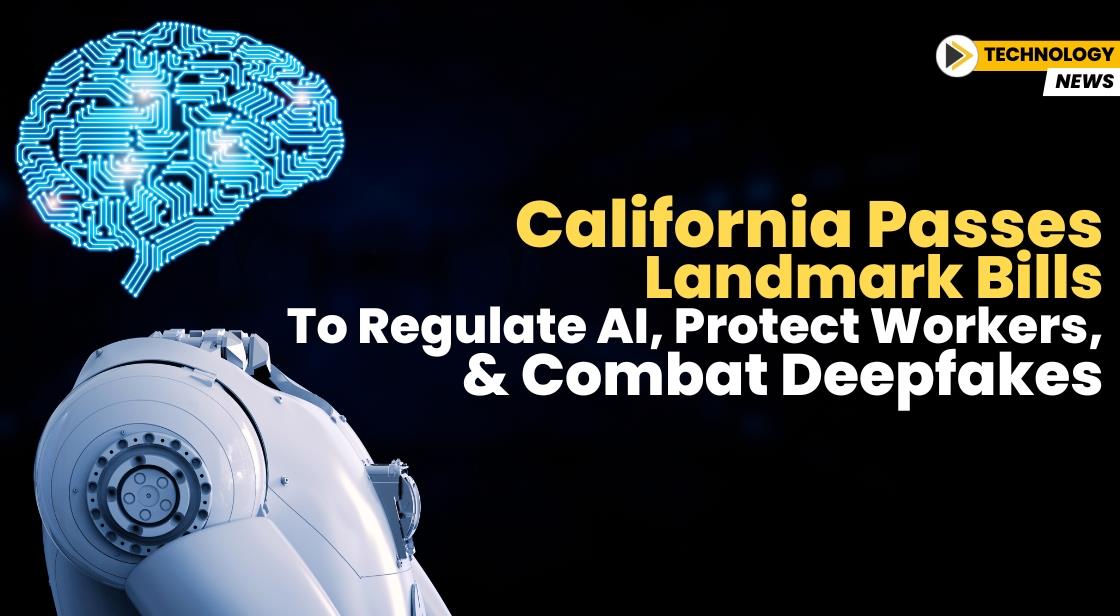California Passes Landmark Bills to Regulate AI, Protect Workers, and Combat Deepfakes

News Synopsis
California lawmakers have taken significant strides in regulating the artificial intelligence (AI) industry, approving a series of proposals aimed at curbing the spread of deepfakes, safeguarding workers, and setting safety standards for AI technologies. These measures come as part of a broader legislative effort to address the rapid advancements in AI and their potential impact on society.
The California Legislature, led by the Democratic Party, is in its final week of the session, working to send numerous bills to California Governor Gavin Newsom for approval. The deadline for these actions is Saturday, with the governor having until September 30 to sign, veto, or allow the bills to become law without his signature.
California Governor Gavin Newsom has expressed concerns about overregulating the burgeoning AI industry, which he believes could stifle innovation. However, the urgency to address the risks associated with AI, particularly in the realms of election integrity and child protection, has driven lawmakers to push forward with these regulations.
Combatting Deepfakes: A Priority for Election Integrity and Child Protection
Amid growing concerns about the misuse of AI to create deceptive content, California lawmakers have passed several bills aimed at combatting deepfakes. These AI-generated videos and images, which can convincingly portray events that never occurred, pose significant risks to both public trust and individual safety.
One key piece of legislation targets deepfakes related to elections. The bill mandates that large social media platforms remove deepfake content 120 days before and 60 days after an election, ensuring that voters are not misled by manipulated media. Additionally, political campaigns would be required to disclose any AI-generated alterations in their advertisements.
In response to the disturbing rise of AI-generated child sexual abuse material, lawmakers approved proposals that would criminalize the creation and distribution of such content. Current laws do not sufficiently address the possession or distribution of AI-generated child exploitation images, but these new measures aim to close that legal loophole.
Another bill requires tech companies and social media platforms to provide AI detection tools to their users, helping them identify and remove harmful deepfake content. This is a significant step in equipping the public with the tools needed to combat the misuse of AI technology.
Setting Safety Guardrails for AI Development
California is poised to become the first state in the U.S. to implement comprehensive safety regulations for large AI models. These regulations, approved by lawmakers, would require AI developers to disclose the data sources used to train their models. This transparency is intended to prevent catastrophic failures and ensure that AI systems operate safely and ethically.
In addition, the state will establish safety protocols to prevent algorithmic discrimination and other risks associated with AI. These protocols will be mandatory for any state agency entering contracts involving AI models that influence decision-making processes. This measure reflects a growing recognition of the need for robust oversight in the development and deployment of AI technologies.
Protecting Workers from AI-Driven Exploitation
The rapid advancement of AI has raised concerns about its impact on employment, particularly in industries where automation could replace human workers. Inspired by the prolonged Hollywood actors' strike, California lawmakers have introduced a bill to protect workers, including voice actors and audiobook performers, from being replaced by AI-generated replicas. This legislation mirrors the language in the contract negotiated by the Screen Actors Guild‐American Federation of Television and Radio Artists (SAG-AFTRA) with studios in December.
Further, state and local agencies would be prohibited from using AI to replace call center workers under another proposal. This move underscores the importance of preserving jobs in sectors vulnerable to AI-driven automation.
California is also considering penalties for companies that digitally clone deceased individuals without the consent of their estates, a practice that has raised ethical concerns as AI technology becomes more sophisticated.
Increasing AI Literacy in Education
As AI becomes an integral part of everyday life, California lawmakers are also focusing on increasing AI literacy among the public. A bill has been approved that would require a state working group to explore incorporating AI skills into the math, science, history, and social science curricula. Another proposal aims to develop guidelines for the use of AI in classrooms, ensuring that students are prepared for a future where AI plays a significant role.
In conclusion, California's proactive approach to regulating the rapidly evolving AI industry underscores the state's commitment to balancing innovation with the protection of public interests. By implementing stringent measures to combat deepfakes, safeguard workers, and establish safety standards for AI development, California is setting a precedent for other states and nations to follow. While Governor Gavin Newsom has voiced concerns about overregulation, the urgency of addressing the potential risks posed by AI has led lawmakers to push forward with comprehensive legislation. As these laws come into effect, they will play a crucial role in shaping the future of AI, ensuring that its benefits are harnessed responsibly and ethically.









